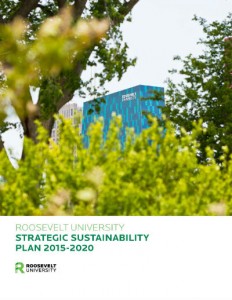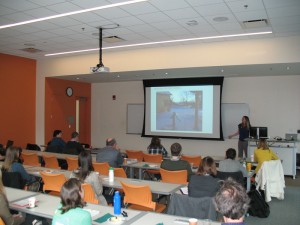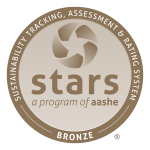Last Friday night (Dec. 18th) at 9:30pm, my fellow STARS Reporting Team members and I submitted Roosevelt’s first-ever sustainability assessment report to the Association for the Advancement of Sustainability in Higher Education, resulting in our university’s earning a Bronze rating. As noted here on the SUST at RU Blog, this was a big milestone in our ongoing sustainability work as well as the culmination of research that began last January in my first SUST 390 Sustainable Campus special topics class, when 19 undergraduate SUST majors broke into teams to dig up and organize the massive amounts of data required across every aspect of the university functions — from academics to outreach to operations to administration and planning.

But while 2015 at Roosevelt was marked by this year-long effort to complete our first STARS self-assessment, the foundation work that made such a project conceivable, let alone feasible, started much earlier. Notably, in 2014 we undertook a major effort to develop a Strategic Sustainability Plan for Roosevelt, which was completed in November 2014, approved by the RU faculty and administration in February 2015, and released in June 2015.
The Plan is road map for the next five years’ worth of sustainability efforts, and we have now fulfilled one of its high-priority short-term goals in completing our first STARS report. This means we have even more data about where we stand as a university and how we need to move forward to improve our efforts in every facet of our operations, from what courses we offer to how we run student orientation to what food we serve in the dining center. The fact that all STARS data from the several hundred colleges and universities who have submitted reports, including our own, is publicly accessible also means that we can learn from what other institutions are doing in order to improve ourselves.
Starting Small, Thinking Big
 One reflection I’ve had in the wake of finishing our STARS report is about how seemingly small efforts can have big impacts. When I trace the origins of our work on this project, one key starting point is the independent study project SUST major Mary Beth Radeck (pictured at left) did in her SUST 395 internship with RU’s Physical Resources Dept in the spring of 2014. Mary Beth researched campus sustainability planning at US colleges and universities, and her final report was an analysis of those plans as well as a fully fleshed-out process and timeline (pdf) for RU to engage in its own sustainability planning process. This proposal was so compelling and well-researched that we simply had to move forward and do it! While I wouldn’t call Mary Beth’s effort “small” by any stretch of the imagination, the fact that such a major initiative of the university began as one undergrad’s research project is testament to the power of a good idea and the value of thinking big.
One reflection I’ve had in the wake of finishing our STARS report is about how seemingly small efforts can have big impacts. When I trace the origins of our work on this project, one key starting point is the independent study project SUST major Mary Beth Radeck (pictured at left) did in her SUST 395 internship with RU’s Physical Resources Dept in the spring of 2014. Mary Beth researched campus sustainability planning at US colleges and universities, and her final report was an analysis of those plans as well as a fully fleshed-out process and timeline (pdf) for RU to engage in its own sustainability planning process. This proposal was so compelling and well-researched that we simply had to move forward and do it! While I wouldn’t call Mary Beth’s effort “small” by any stretch of the imagination, the fact that such a major initiative of the university began as one undergrad’s research project is testament to the power of a good idea and the value of thinking big.

Similarly, the SUST 390 class (pdf of syllabus) that worked on researching the baseline data we needed to do the STARS report was itself an experiment from the ground up, one for which we had no blueprint — only faith in the power and potential of student researchers to tackle a complex and extremely time-consuming project in a finite amount of time. While we were exploring unknown territory in the course (which frankly added to its inherent excitement, for me), the value here was obvious: students came through with a tremendous effort and they learned an incredible amount about their university and the STARS system in the process.
 Why I’m Happy We Got Bronze
Why I’m Happy We Got Bronze
With sustainability rating systems like LEED or STARS, it’s admittedly easy to get caught up in the chase for achieving the highest rating possible. That’s part of the point of such rating systems: to incentivize institutions to earn high ratings that reflect well upon their efforts and burnish their green reputations. Let’s face it: all of us like accolades, right?
But merely focusing on the particular level of an institution’s STARS rating — gold, silver, bronze, etc. — misses the real significance of undergoing this process of self-reflection and institutional assessment. So here are a few reasons why I’m happy with our Bronze rating here in 2015:
- Just getting to Bronze itself is a big deal. The STARS assessment system is thorough and exacting, and amassing data and evidence to warrant a Bronze-level certification is difficult, not only in terms of what you have to do to get there, but also in the process of documenting those efforts.
- Notably, many of the STARS-reporting institutions that are at Silver or Gold achieved those designations in their 2nd or 3rd reporting cycles. So the fact that RU did this in our first go-around is a fine thing indeed.
- Pursuing sustainability at a college or university campus — let alone a town or a city — is a highly complex and always ongoing task. Our Bronze designation is a literal statement that (a) we’ve accomplished a lot so far, and (b) we’ve still got a long way to go. This in itself is great incentive to keep moving forward, not the least because (like the pursuit of scientific knowledge itself) we will never be done.
- The teamwork and dedication that made our STARS report possible in the first place is inspiring. This might be the biggest payoff of all: the joy and rewards of working together on a worthy project on behalf of our institution.
Giving Thanks
On that last note, I want to thank the fellow members of our STARS Reporting Team (Rebecca Quesnell, Maria Cancilla, Graham Pickren, Brennan Morrow, and Shannon Conway) who undertook this in the fall of 2015 as a collaboration between the Department of Physical Resources and the SUST Program’s new Roosevelt Urban Sustainability Lab; Paul Matthews, Assistant VP for Planning & Operations, for this unflagging leadership of all things sustainable at Roosevelt; and the students in my SUST 390 Sustainable Campus class last spring (Cassidy Avent, Yessenia Balcazar, Maria Cancilla, Shannon Conway**, Colleen Dennis *, Jordan Ewbank*, Courtney Hackler, Kyle Huff, Reece Krishnan, Tom Lewallen**, Melissa Maslowski, Ana Molledo*, Kelsey Norris*, Jennifer Paddack, Rebecca Quesnell*, Emily Rhea, Deidra Sharp, Sera Sousley** and Jesse Williams*.
(*graduated May 2015; ** graduated Dec 2015).